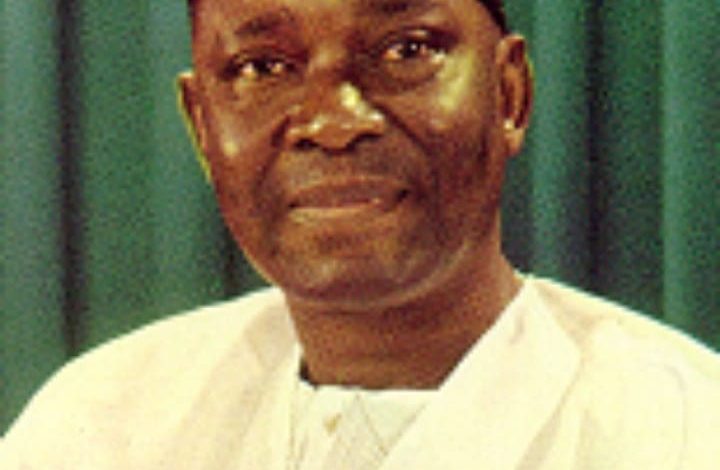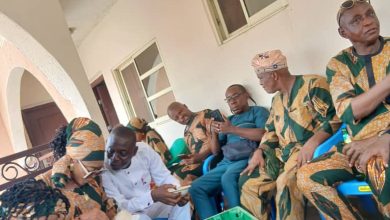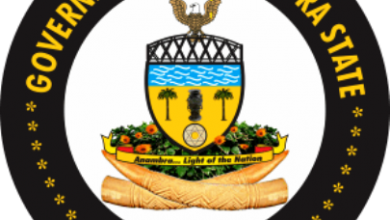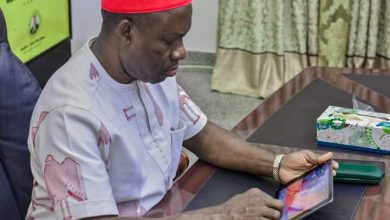
FOR MANY OF THOSE who lived in colonial Nigeria, Nnamdi Azikiwe was a super-man sent especially to free them from alien rule. Unable to understand Zik’s persona, fables were woven around him. A story has it that as a child, Zik saw an old woman carrying a heavy load. Moved with pity, he offered to help her. On reaching her home in the forest, the old woman who was in fact a spirit, asked Zik what she could do for him. Zik requested for wisdom and power. The woman obliged. She cut Zik into bits and boiled the flesh in a big pot. Later, she magically brought him back to life. On her request, Zik killed the woman to prevent her from performing the same feat for others. That explains his legendary source of wisdom and power over his fellow man.
Another has it that with the magical gift from the old woman of the forest, Zik managed to extricate Nigeria out of a deadly situation. Ages ago, the Atlantic Ocean was inhabited by a wicked mermaid who caused the water to overflow its banks perennially to drown thousands of Nigerians. For a long time, the people of Lagos prayed for a redeemer. None came. When Zik learnt of their predicament, he went into the ocean and challenged the wicked mermaid to a contest. First, Zik changed into a spirit, entered a bottle and then came out. Then he dared the mermaid to do the same. The mermaid quickly changed into a spirit and entered the bottle. But before it could come out, Zik corked the bottle and took it away. Since then the Bar Beach has been given less trouble. The moral of the fable was that if Nigerians annoyed the politician too frequently, he could release the mermaid to torment Lagosians again. Could if be that he had actually released the mermaid to cause the recent flooding of parts of Victoria Island?
Even if these myths evoke laughter there is a sense in which even those close to Zik helped to elevate him to legendary proportions. With years, however, the man became situated more and more in an earthly context.
To Chukwuemeka Odumegwu-Ojukwu, Ikemba Nnewi, Zik was the indefatigable fighter for freedom and equality. As he later saw him up close: “At independence, he cut a rather tragic figure. He was to met the symbol of a Nigeria that would have been but was not.” As leader of secessionist Biafra, the former warlord disagreed with the Owelle’s politics of compromise which Ojukwu believed, left the Igbo naked.
Adeniran Ogunsanya who grew from just in admirer as a boy in King’s College, Lagos, when he used to sneak out to listen to public lectures delivered by Zik, to a political associate saw the late elderstatesman as an embodiment of “all the virtues a man of the people can have.” He listed these to include Zik’s respect for the opinion of others, charisma and uncompromising nationalism.
He cited an occasion when he, Ogunsanya presided over a meeting in which the Owelle was in attendance. According to him, he was overwhelmed by admiration when Zik, with the greatest humility called out and said: “Mr Chairman, can I have your permission to say one or two things?” Ogunsanya reflected: “Can you imagine Zik saying ‘Mr Chairman’ to a little boy like me?”
Even those who were opposed to Zik politically spoke of him with awe and in superlatives. As an opponent, Kingsley Mbadiwe wrote that Zik was like a god when the colonialists were administering Nigeria. “His orders,” according to Mbadiwe, “were feared by everybody, including the police.” On his person, Mbadiwe noted that Zik had what he described as “a varied nature. But he was more patient than myself, perhaps accountable by age difference, but his patience can be overtaxed and when he wants to fight, he fights like a wounded lion.” According to Mbadiwe, Zik had a messianic outlook like Mahatma Gandhi of India in certain respects. But unlike Gandhi who said he was the light and the way, Zik only showed the light for people to find the way.
Despite the mythic heights to which he was raised, Zik was nothing if not pragmatic, always conscious of his limits and ever eager to extract all that was possible from that limited horizon. Even though his nationalist endeavours contributed immeasurably to Nigeria’s independence, he knew how to make the best out of his loss of the prime ministership to Abubakar Tafawa Balewa in 1959. During his swearing-in as governor-general in November 1960, Zik quoted Douglas Malloch rather tellingly: “If you can’t be a sun, be a star.” As he saw it: “My stiffest earthly assignment is ended and my major life’s work is done. My country is now free and I have been honoured to be its first indigenous head of state. What more could one desire in life?”
Much more if the opportunity availed itself. Thus in 1979, he made for the hustings again when he saw that the post of first executive president of Nigeria ought just to be within his reach. He failed. He tried again in 1983 and failed again – more disastrously. So incensed was he with what he saw as the barefaced rigging of the 1983 elections by the ruling party that literally swore, quoting Proverbs (11:21) to express his faith that surely, “the wicked shall not go unpunished.” Three months later, the military struck, throwing many of the architects of Zik’s defeat into detention and forcing others into self-exile for 10 years.
Zik’s capacity to forgive was also legendary. In 1989 when the hoax over his purported death made rounds thus giving him the distinction of one of the very rare persons to read of his own obituary while yet alive, he readily forgave R.B.K. Okafor and Mbadiwe, the pair who played major roles in selling his “death” story to the media.
Even as a public man, his private life was shrouded in mystery. He married Flora Ogboegbunam in 1936 when he was 32 years. Between them, they had one daughter and three sons. Chukwuma, his first son, is a diplomat, while Chukwuemeka is a businessman. Not much is known about Zik’s children.
Apart from the occasional appearance at state occasions with her husband as president, Lady Flora was hardly seen in public and less even known of her. From 1966 when Zik stopped being Nigeria’s president to 1983 when she died, Lady Flora could have passed for cypher in the consciousness of Nigerians. And although Zik later married Uche and had more children by her, what sort of father he was did not enter into the conscious of his compatriots. Zik himself hardly wrote or said anything about family life, and certainly not his own. There was no sign that he was close to his kids, especially those of his late wife. After his death May 11,1996 only his half sister, Obiageli Ifejika, made one or so utterances concerning his burial, Zik’s first son arrived four days after his father’s death.
Born to Igbo parents from Anambra State, Eastern Nigeria in Zungeru in present-day Niger State, as a young boy he learned to speak Hausa (the main indigenous language of the Northern Region). Azikiwe was later sent to live with his aunt and grandmother in Onitsha (his parental homeland), where he learned the Igbo language.[citation needed] A stay in Lagos exposed him to the Yoruba language; by the time he was in college, he had been exposed to different Nigerian cultures and spoke three languages (an asset as president.
Azikiwe travelled to the United States where he was known as Ben Azikiwe and attended Storer College, Columbia University, the University of Pennsylvania and Howard University. He contacted colonial authorities with a request to represent Nigeria at the Los Angeles Olympics. He returned to Africa in 1934, where he began work as a journalist in the Gold Coast.In British West Africa, he advocated Nigerian and African nationalism as a journalist and a political leader.
Early life and education
Azikiwe was born on 16 November 1904. His first name means “my father is alive” in the Igbo language, as his parents were Igbo. His father, Obed-Edom Chukwuemeka Azikiwe(1879–3 March 1958), a native of Onitsha, was a clerk in the British Administration of Nigeria, who traveled extensively as part of his job. Azikiwe’s mother was Rachel Chinwe Ogbenyeanu (Aghadiuno) Azikiwe (1883–January 1958), who was sometimes called Nwanonaku and was the third daughter of Aghadiuno Ajie. Her family descended from a royal family in Onitsha, and her paternal great-grandfather was Obi (Ugogwu) Anazenwu. Azikiwe had one sibling, a sister, named Cecilia Eziamaka Arinze
That’s the vintage Zik enigma, Nigeria’s spirit-man.My
CULLED FROM GOGGLE



